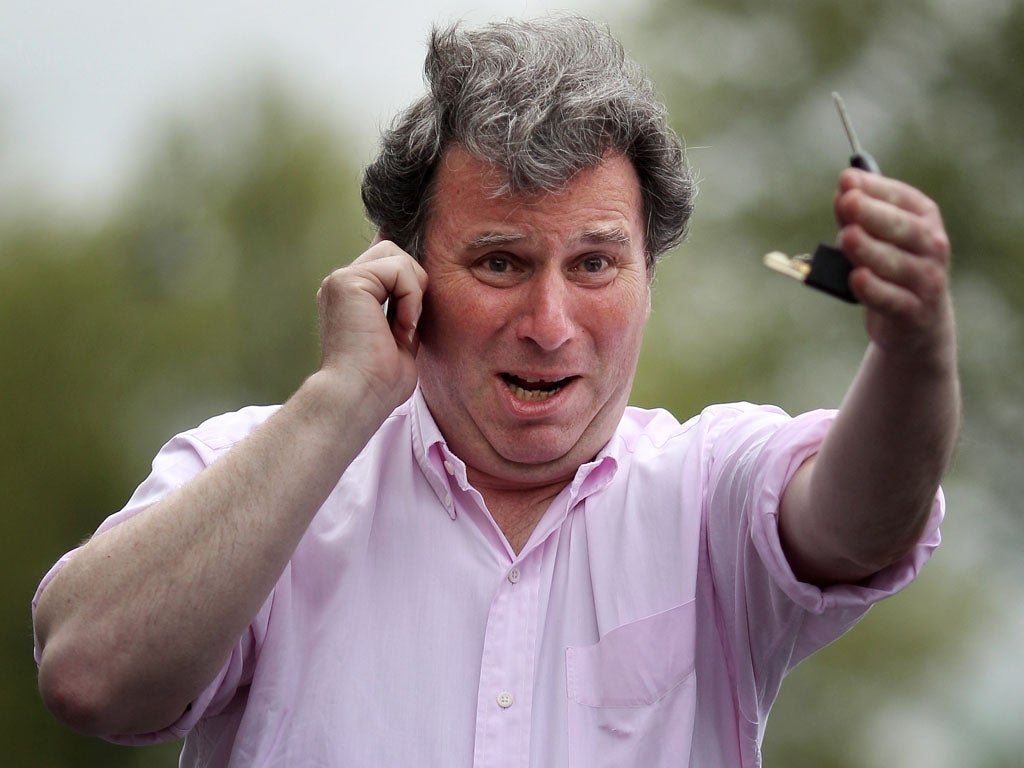Oliver Letwin's crash course in cycle safety
Our diarist notes a rather startling disregard for the rudiments of road safety from the former Cambridge don in philosophy who heads up Tory policy


Your support helps us to tell the story
From reproductive rights to climate change to Big Tech, The Independent is on the ground when the story is developing. Whether it's investigating the financials of Elon Musk's pro-Trump PAC or producing our latest documentary, 'The A Word', which shines a light on the American women fighting for reproductive rights, we know how important it is to parse out the facts from the messaging.
At such a critical moment in US history, we need reporters on the ground. Your donation allows us to keep sending journalists to speak to both sides of the story.
The Independent is trusted by Americans across the entire political spectrum. And unlike many other quality news outlets, we choose not to lock Americans out of our reporting and analysis with paywalls. We believe quality journalism should be available to everyone, paid for by those who can afford it.
Your support makes all the difference.Oliver Letwin, the policy wonk in the Cabinet Office, is one of the most appealing of Conservative ministers (a title for which the competition is admittedly far from stiff), and not only because of the absent-mindedness which led him to be photographed chucking away government papers in waste bins in St James’s Park. He is a minister who thinks and forms opinions instead of spouting civil servant speak.
The result, though, can be somewhat startling, as pupils at Bridport’s St Mary’s Primary School in Letwin’s West Dorset constituency have discovered. They invited him into the classroom to talk about why 11- and 12- year-olds should be compelled to wear helmets when cycling. To their surprise, he did the opposite. According to View from Bridport, he told them: “I’m against legislation that would make wearing cycle helmets compulsory. I think things like that should be down to the individual. I don’t think wearing seat belts in cars or wearing helmets on motorbikes should be compulsory either.”
For the record, the statisticians reckon countries which have made the wearing of seat belts in cars compulsory have had a 20 per cent fall in road deaths, and the Transport Research Laboratory has calculated that crash helmets could have saved the lives of 10 to 16 per cent of cyclists who have died on the roads.
Twigg took his courage from a Coward
“I had great teachers,” the shadow Education Secretary Stephen Twigg told the final day of the Labour conference. “One of them was called Mr Coward.
Mr Coward gave me the courage to become the first pupil from Southgate Comprehensive to go to Oxford.”
Coward – courage: a clear case of nominative counter-determinism.
Yvette ducks clash with memory man
Whether or not you agree with David Cameron that Ed Balls, pictured, is “the most annoying person in modern politics” he is indubitably one of the most competitive. He was shamelessly proud of the two goals he scored in the match against the press before the Labour conference, despite a rumour he dived to gain a penalty.
Later, he toured the stalls, and tried out a competitive memory game organised by the Charities Aid Foundation, outscoring his fellow MPs. According to Hannah Terry, CAF’s head of policy: “The next day he brought Yvette. He popped his head round and said: ‘Am I still top?’ I told him he was. He said: ‘Yvette, come here and look – I’m top.’ I asked Yvette if she wanted to play, but she didn’t. I’m not sure she wanted to get into a competition.”
Straw’s bus ride into the real world
In 1997, there was a story doing the rounds about a Tory who had been in government for so long, riding in chauffeur-driven limousines, that he left his home in a hurry one morning, climbed into the back of his vehicle and sat there wondering why it was not moving. I always thought this was apocryphal, until I saw a passage from Jack Straw’s memoir, Last Man Standing, about the shock of travelling like an ordinary Joe after 13 years in Cabinet: “I was dozing gently. I felt for the seat belt. It wasn’t in its usual position. I guessed it was time for The Archers – I’d ask the detective in front to turn on Radio 4. Luckily, I stirred from my torpor. I was no longer in the rear of a police vehicle. The man in front was not a detective, but a fellow passenger. I was on the 159 bus.”
Join our commenting forum
Join thought-provoking conversations, follow other Independent readers and see their replies
Comments